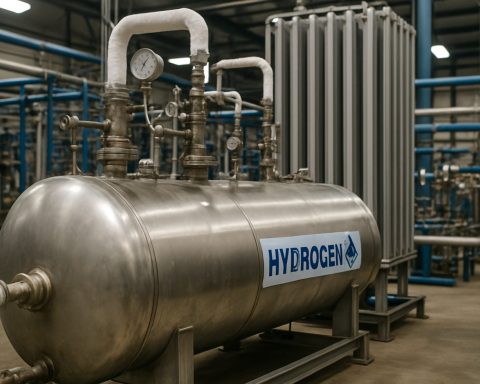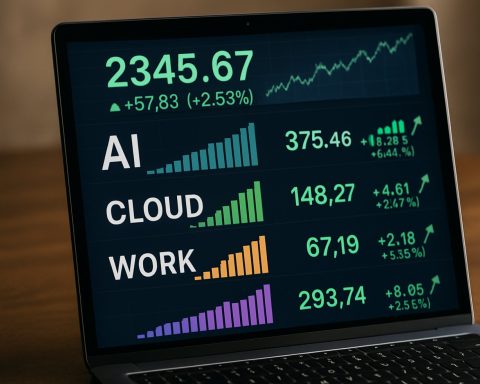- Chinese tech giants ByteDance, Alibaba, and Tencent are investing $16 billion in Nvidia’s H20 AI chips, highlighting China’s commitment to advancing AI technology.
- Nvidia’s H20 chips serve as a strategic solution to navigate U.S. export restrictions, positioning the company as a critical player in technological diplomacy.
- The H20 chips are poised to revolutionize AI capabilities, supporting the growth of Chinese social media, e-commerce, and entertainment sectors.
- Potential chip shortages, highlighted by warnings from H3C, threaten to disrupt China’s AI development and intensify competition among tech manufacturers.
- Nvidia’s CEO, Jensen Huang, foresees a shift towards U.S.-based production, reflecting the company’s delicate balance of geopolitical challenges and business strategies.
- Nvidia’s strong revenue from China underscores its market dominance, even as geopolitical tensions like tariffs and export bans threaten the landscape.
- The ongoing AI race is marked by resilience and innovation, with Nvidia at the forefront, influencing the trajectory of digital transformation worldwide.
Nvidia, the titan of silicon alchemy, finds itself at the heart of a seismic shift in the global tech landscape. As the curtains lift on the year 2025, Chinese giants ByteDance, Alibaba, and Tencent have pledged a staggering $16 billion to secure Nvidia’s groundbreaking H20 AI chips. With an insatiable hunger for technological advancement, China’s tech behemoths are poised to redefine the limits of artificial intelligence.
As China relentlessly charges forward in the AI arena, the demand for Nvidia’s H20 chips reflects a strategic maneuver designed to circumvent the stringent U.S. export restrictions. These meticulously crafted processors emerge as the pinnacle of what Nvidia can legally supply to China, creating a delicate yet critical bridge in the ever-evolving dance of technological diplomacy.
Behind the high walls of innovation, the H20 chips are not merely circuits etched on silicon but are vessels of revolutionary potential. They hum with the promise of propelling AI capacities to unprecedented heights — a promise that China’s rising titans are eager to seize. Known for their prowess in social media, e-commerce, and entertainment, ByteDance’s TikTok, Alibaba’s sprawling marketplaces, and Tencent’s gaming empire are each bunkering down with the firepower of Nvidia’s innovations, preparing for a new era of digital dominance.
Yet, all is not serene beneath the surface. The ominous specter of chip shortages looms large over this burgeoning AI ambition. In March, H3C sounded a clarion call, warning of potential scarcities that could stifle China’s AI engine. The knives of competition are being sharpened in server farms, with H3C, Inspur, Lenovo, and Huawei’s xFusion at the frontline, scrambling to equip China’s digital warriors.
In an age where machines etch out new paradigms of reality, Nvidia plays a dual role as both creator and diplomat. CEO Jensen Huang envisions a horizon where U.S.-based production might contrast with today’s reliance on a global supply chain—a testament to the tightrope Nvidia walks, balancing geopolitics with business foresight.
Yet, the engine of Nvidia churns at the heart of another vital construct: trust. Nvidia’s $17.11 billion revenue from the Chinese region (including Hong Kong) is a testament to its unshakeable presence in the Asian market. But as talks of tariffs and export bans echo from the halls of the Biden administration, the company stands at a crossroads. How it navigates these tempestuous waters will not only reshape its destiny but also the future of AI as we know it.
In this thrilling theatre of technological innovation, the indelible takeaway rings clear: the AI race is not a sprint but an unyielding marathon — one driven by silicon fortitude and the relentless pulse of human ambition. As Nvidia continues to sculpt the future, the world watches, knowing that each silicon beat could very well alter the rhythm of our digital symphony.
China’s $16 Billion Bet: Nvidia’s H20 AI Chips at the Forefront of Technology and Geopolitics
Understanding Nvidia’s H20 AI Chips and Their Impact
Nvidia’s H20 AI chips are poised to revolutionize the AI landscape, particularly in China, where tech giants ByteDance, Alibaba, and Tencent have committed $16 billion to acquire these cutting-edge processors. This massive investment indicates a strategic push by China to surpass existing technological barriers while circumventing U.S. export restrictions.
Key Features and Specifications
1. Advanced Architecture: The H20 chips are designed with a focus on deep learning acceleration, energy efficiency, and real-time processing capabilities.
2. Legal Compliance: These chips represent the maximum technological power that Nvidia can legally offer to Chinese companies under current geopolitical constraints.
3. Performance: Expected to vastly outperform existing models, enabling faster AI model training and implementation, crucial for applications in social media, e-commerce, and gaming.
Real-World Use Cases
– ByteDance: Enhancing user experience and data analysis for TikTok, potentially leading to more personalized content and improved engagement metrics.
– Alibaba: Streamlining logistics and customer service using AI-enhanced chatbots and recommendation systems in its online marketplaces.
– Tencent: Developing sophisticated AI algorithms to optimize its gaming platforms for better user interaction and immersive experiences.
Industry Trends and Market Forecast
– AI Investment Surge: AI technology investment will continue to rise, with a projection that the Chinese AI sector could be worth over $150 billion by 2030 (source: PwC).
– Semiconductor Race: As the demand for AI chips grows, competitors in the semiconductor industry, like AMD and Intel, will be compelled to innovate aggressively.
Controversies and Limitations
– Geopolitical Tensions: The push by Chinese companies to acquire advanced AI chips highlights ongoing geopolitical tensions, particularly concerning technological sovereignty and the role of U.S. tech restrictions.
– Ethical and Privacy Concerns: The use of advanced AI in consumer applications raises significant ethical considerations regarding data privacy and algorithmic bias.
Pros and Cons Overview
Pros:
– Enhances AI computing potential.
– Positions Chinese companies as leaders in tech innovation.
– Ensures compliance with current export laws.
Cons:
– Potential exacerbation of geopolitical tensions.
– Dependence on U.S. technology could become a vulnerability.
Security and Sustainability
– Production Diversification: Nvidia is considering increasing U.S.-based production to mitigate risks associated with global supply disruptions.
– Sustainability Initiatives: Emphasizing energy-efficient design in its AI chips to reduce carbon footprint.
Quick Tips for AI Enthusiasts and Stakeholders
– Stay Informed: Keep abreast of updates in AI technology and geopolitical developments.
– Diversify Sources: Consider diversifying technology supply chains to mitigate risks associated with geopolitical dependencies.
– Evaluate Ethical Impacts: Regularly assess the ethical implications of AI implementations to ensure competitive yet responsible advancements.
For more insights into AI and technology, visit the official websites of Nvidia and PwC.







